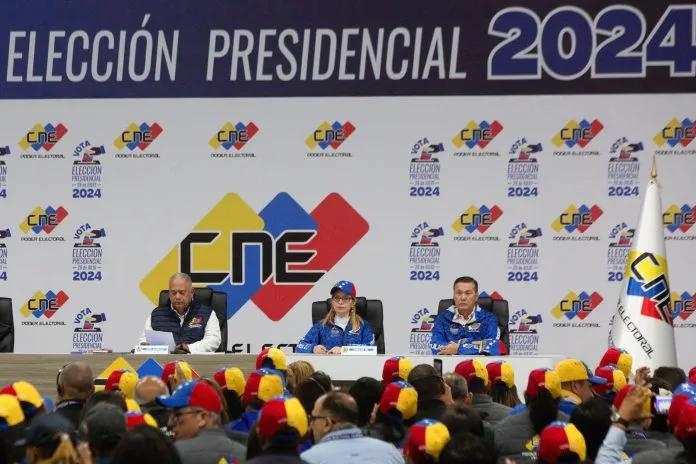In the aftermath of the recent Venezuelan presidential election, significant doubts have emerged regarding the results announced by the National Electoral Council (CNE). The CNE declared Nicolás Maduro the winner with 51.2% of the votes, while his main opponent, Edmundo González, received 44.2%. Despite this announcement, experts and opposition figures have raised concerns about the validity and transparency of the results. This detailed analysis explores the issues surrounding the election results, including the mathematical and procedural concerns, as well as the responses from key figures in Venezuela.
Overview of the Election Results
The CNE’s Declaration
On the night of July 28, 2024, at approximately 12:00 AM, Elvis Amoroso, the president of the CNE, proclaimed Nicolás Maduro as the winner of the presidential election. According to the initial results released by the CNE, Maduro received 5,150,092 votes, which represents 51.2% of the total. His opponent, Edmundo González, garnered 4,445,978 votes, or 44.2%. The voter turnout for this election was reported to be 59%.
The announcement came after the CNE had processed 80% of the transmitted data. Despite the official declaration, the results have been met with skepticism from various quarters, including political analysts and opposition figures.
Mathematical Concerns
Eugenio Martínez, a journalist and electoral expert, has raised concerns about the mathematical validity of the results. According to Martínez, the results announced by the CNE cannot be considered irreversible or fully auditable at this stage. He pointed out that with a margin of approximately 700,000 votes between the two candidates and over 2 million votes still to be counted, there is a possibility that the results could change.
Dos problemas básicos tiene el anuncio del pdte del CNE. 1) Aunque los calificó de irreversibles, una simple operación aritmética sirve para comprobar que no es así. 2) Los resultados hasta ahora -lunes 2:32am- no son auditables
— Eugenio G. Martínez (@puzkas) July 29, 2024
ADVERTISING
Martínez’s analysis highlights the need for further verification and counting to ensure the accuracy of the results. His comments underscore the broader issue of transparency and accountability in the electoral process.
Opposition’s Response
María Corina Machado’s Rejection
María Corina Machado, a prominent opposition leader, has rejected the CNE’s announcement, asserting that the results are not reflective of the true outcome of the election. According to Machado, the opposition coalition, Plataforma Unitaria, possesses more than 40% of the electoral records, which reportedly show a different picture than that announced by the CNE.
Machado claimed that the actual results, based on the records they have, indicate that Edmundo González won the presidency with 70% of the votes, while Maduro received only 30%. She argued that the discrepancies between the recorded results and the official announcement suggest serious irregularities.
Claims of Fraud
The opposition’s rejection of the results is accompanied by accusations of electoral fraud. Machado and other opposition figures have suggested that the CNE’s announcement is part of a broader attempt to manipulate the election outcomes. They argue that the discrepancies in the results and the lack of transparency in the counting process undermine the credibility of the election.
These claims have been echoed by various international observers and organizations, who have called for a thorough investigation into the electoral process. The opposition’s response reflects a broader skepticism about the fairness and integrity of the election.
The Importance of Transparency and Verification
The Need for Comprehensive Audits
The concerns raised by Martínez and Machado highlight the critical need for transparency and comprehensive audits in the electoral process. To ensure the legitimacy of the election results, it is essential that all votes are accurately counted and that the process is open to scrutiny by independent observers.
Transparency in the electoral process is crucial for maintaining public trust and ensuring that the results reflect the will of the voters. Comprehensive audits and verification procedures are necessary to address any doubts and to confirm the accuracy of the results.
International Reactions
The international community has closely monitored the situation in Venezuela and has expressed concerns about the transparency of the election. Calls for an independent review of the electoral process and for greater access to electoral records have been a common theme in international responses.
The reactions from other countries and international organizations will play a significant role in shaping the response to the election results and in addressing the concerns raised by various stakeholders.
Conclusion
The recent Venezuelan presidential election has been marked by significant controversy and skepticism. The announcement of Nicolás Maduro as the winner, despite the concerns raised about the irreversibility and auditability of the results, has sparked a broader debate about the integrity of the electoral process.
The concerns highlighted by experts and opposition figures emphasize the need for transparency and thorough verification of the election results. As the situation continues to unfold, the focus will remain on ensuring that the electoral process is fair, transparent, and reflective of the will of the Venezuelan people.
The international community’s response and the steps taken to address the concerns raised will be crucial in determining the future of Venezuela’s political landscape and in upholding democratic principles.


